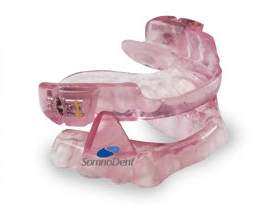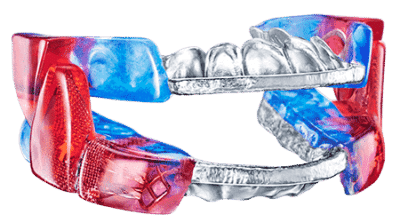Sleep apnea is a potentially deadly condition that leads to many serious health risks. Heart attack, stroke, pulmonary embolism, anesthesia complications, and even car accident risks are increased in sleep apnea sufferers. Worst of all, perhaps 90% of people who suffer from it don’t know they have it.
Sleep dentist, Dr. Melissa Sheets has good news, though: sleep apnea treatment is very successful and covered by most insurance. Dr Sheets is the leading sleep apnea dentist in the region an as such we have treated patients not only from Omaha Nebraska, but all over Nebraska and the Midwest. If you have been diagnosed with or suspect you have sleep apnea, please call (402) 493-4175 or email Dr. Sheets for a consultation about your treatment options.
What is Sleep Apnea?
Sleep apnea is when your breathing stops at night. It stops long enough that your blood oxygen level drops and your brain senses danger. It awakens a little to get you breathing again, as well as to tell your heart to pump harder and faster, just in case that was the problem.
Because you don’t fully wake up, you may not be aware of the cause of your wakefulness, or if you become fully awake, you might think it was because you had to go to the bathroom or due to some random noise. But this happens up to several hundred times a night, with the consequence that your brain can’t ever reach the deep restorative sleep stages it needs, and your heart is being told to beat harder and faster, causing blood pressure spikes and putting strain on your heart and blood vessels.
Types of Sleep Apnea
There are two main types of sleep apnea. Obstructive sleep apnea (OSA) affects the vast majority of sufferers. This type occurs because your airway collapses when you sleep: you are literally suffocating. During the day, our airway is held open by gravity and by your muscles. But when you sleep, your muscles relax and the tissue of your throat can close if they are unsupported. If your jaw is out of position, you are overweight, or you have an anatomically narrow airway, your airway is likely to collapse.
The less common type is central sleep apnea. In this type, your brain simply stops telling your body to breathe. The causes for this form of sleep apnea are not yet fully understood.
A small percentage of sufferers have both types in what is called Complex Sleep Apnea. Complex Sleep Apnea is a combination of obstructive and central sleep apnea, and can be treated with a combination of oral appliance therapy and CPAP.
Snoring and Other Symptoms of Sleep Apnea
Snoring is very common, and many people disregard it as a nuisance. However, snoring is often a sign that you’re at increased risk for obstructive sleep apnea. Snoring is caused by an airway that narrows during sleep, causing a turbulent airflow, which causes your throat to vibrate, what we hear as snoring.
As much as 70% of sleep apnea sufferers snore, making it one of the most common symptoms of sleep apnea. Some other common symptoms that are associated with it include:
- Morning headaches
- Fatigue
- Insomnia
- Daytime sleepiness
- The inability to concentrate
- A lack of energy
- Inability to lose weight despite dieting and exercise
- Restlessness
If you snore and have any of the symptoms above, it’s important to undergo a sleep study provided by a sleep physician to get a diagnosis. After a sleep study, it can be determined whether or not you suffer from sleep apnea and if your snoring problem requires treatment.
Dangers of Sleep Apnea
Sleep apnea has been associated with numerous serious, even life-threatening health conditions, including:
- Heart attack
- Stroke
- Coronary artery disease
- Diabetes
- Pulmonary embolism
- Mood disorders including depression
- High blood pressure
Among numerous others. Treating it can reduce the danger of this condition.


Treating Sleep Apnea
If you have sleep apnea, you should get professional care. There are no home care approaches that you can use to manage the condition. However, there are many good professional treatment options for sleep apnea, including:
- CPAP
- Oral appliance therapy (OAT)
- Surgery
CPAP utilizes an air pump to force air into your throat to open your airway.
Oral appliances can take several approaches to help hold your airway open, but the most common method is mandibular advancement: repositioning your jaw to support your soft tissue better.
Sleep apnea surgery can reshape your airway by removing soft tissue or reshaping your bone, which can reduce the risk that your airway will collapse. You can also receive an Inspire implant, which electrically stimulates your airway muscles to support your airway during sleep.
Don’t Neglect Snoring and Sleep Apnea Treatment – Contact Us!
Since snoring is a common symptom of sleep apnea, don’t wait to schedule an appointment with Dr. Sheets to learn more about snoring, sleep apnea, and the treatments that are available for both conditions. Ready to get started? Call our office at (402) 493-4175 or email us today.
